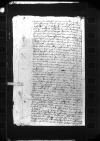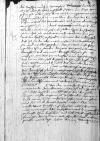Wir habenn hie ewer freuntlich ⌊⌋, datum zu ⌊Valldolit⌋ XII im Julio den VII des vorgangen Octobris nebnn señor ⌊Diego Gracian⌋ ⌊⌋ entfangen. / Daraus wir gernn vornomenn, / das ir das mol mit ewer togentszamenn ⌊hausfrawenn⌋ in gutte[r] gesuntheit gewesenn, / darinnen euch mit allerglu[ck]seligheit Got der almechtig lange zceit durch sein gnad wold enthaldenn. / Wir sein ouch noch, / Goth habe lob und danck, frisch und wolgesunt, / und disse zceit herr mit einemm hohernn unnd vil reichernn bischtumb, dan dis gewesen, / aus gotlicher barmherczigheit versorgt, / dar hin wir uns noch dreyen wochen von hynnenn thun begebnn, / und ist hie in ⌊Preussen⌋ gelegen, / ⌊Ermeland⌋ oder ⌊Heilsberg⌋ genent. / Goth vorley es uns zu ehren seines gotlichen namens, / gemeiner cristenheit zu guth und zu unser selen seligheit zubesiczenn etc.
Wie ir anczeigt, / das ir uns vil mol geschribenn / und im negstnn was ⌊mutter⌋ und ⌊tochterr⌋ angheth weitlofftig bericht gethon, / losse wir euch wissen, das w[ir] im jore keinenn briff dan dissen leczstnn vonn euch habnn uberkomenn. / Uns ist wol vor etlichnn moneten vonn unser beyder guttemm freunde herrn ⌊Wolff Haller⌋ ⌊⌋ worden, aber ewer oder ewer brive nichts gedocht. / Mugen nicht vorsthen, wie es zu geth, / villeicht mag noch was von im komenn etc.
Unmucz ist gar nicht zcwischen uns und euch, / wirt ouch nummer werden. / Wold Goth es sich so zutruge, das wir euch wolhabend und gesunt mochten sehenn, / wir werden ouch noch wie irschreibt, / etlich jore junger, / das vileicht geschen muchte, / so euch Goth gesunt mit ⌊weib⌋ und kint ins ⌊Deuczland⌋ widerummb wirt helffenn.
Von herrn Maximiliano oder ⌊Albrcht Kuon⌋ / ist uns bisher kein schreibnn geworden, / des secretarien ⌊Gracian⌋ brive sein uns allein etlich zukomenn, / dem wir dis mol uff alles antwurtnn. / Er darff sich grosses brautschaczes zu uns nicht vorseh[en]. Hette euch die ⌊mutter⌋ die ⌊tochter⌋ gebenn, / wer ir un[d] der tochter nuczerr gewesenn. Dieweil es sich aber so hoth geschickt / (: wan ein ding geschen, / ist aller roth benomenn :), musse wirs auch lossen guth sein. / Wollen dennoch dar bey muglicher weis des ⌊secretarienn⌋ und seiner ⌊braut⌋ nicht vorgessenn etc.
Das wir uns die ⌊mutter⌋, wie ir schreibt, sollenn lossen befholenn sein, / hot sie umb uns nicht vordint. / Het sie uns die ⌊tochter⌋ geschickt, wer wir das billich schuldig. / So sie die aber einemm andrenn ane unser wissen und willenn gegebenn, / das sie uns nicht hoth wollen thun, / sonder die uns vor parr gelt vorkowffenn, / und nymant kowfft, das sein ist, / so mag sie sich von irem tochter man lossenn vorsorgen etc. Das sie ir lebenn sold bessernn, / do ist nicht hoffen, zu ein vochs wandelt wol das hor, / aber die natur nicht etc.
Das ir rais uff unser schreibenn, hanczuch, / stuczen, / visnagen etc. habt zugeschickt, / dar vor thu wir euch freuntlich danckenn. Es ist uns aber bisher nichts do vonn zu komenn. / Wan uns solchs wirt, / wolle wir uns widerummb gen euch recht haltenn etc.
Vor die new czeitunge uns mitgeteilt dancke wir euch ouch. / Von hynnenn ist, / Goth bessers, / nemlich was ⌊romische konigliche majestet⌋ belangt, / nichts angemens zu schreibnn. / Des unlusts wirt ummer mherr zcwischen uns cristenn, und der ⌊Turk⌋ kompt teglich naherr. / Got der wolle uns beysthen, / ist hoch von notenn, / dem wir euch mit unser libenn gefatterin und dem ganczenn geslechte thun befelenn, / und bittnn uns offter unnd gewisser dan zuvor wolt schreibenn. /

